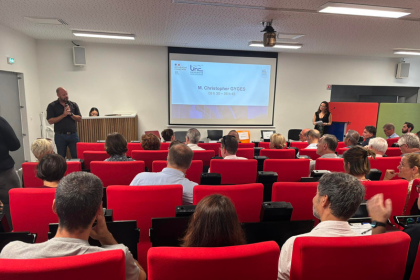 The SMSP Group took part in the conference on industrial decarbonisation, which was held on 26th of March at the University of New Caledonia (UNC). Céline DELPECH, Human Ressources Manager, and Ulrich REBER, Project Director represented the group.
The SMSP Group took part in the conference on industrial decarbonisation, which was held on 26th of March at the University of New Caledonia (UNC). Céline DELPECH, Human Ressources Manager, and Ulrich REBER, Project Director represented the group.
The event was attended by over 80 participants, including representatives from the Haut-Commissariat, the New Caledonian Government, mining companies such as SLN, PRNC, SMSP, along with relevant companies, CNRTECH, ACE, Enercal, GBNC, Biscochoc, Finc/Medef, Total Energies Nouvelles, UNC researchers, consultants, technical consultancies and clusters such as Synergie and AMD (represented by Didier Coulon).
What is decarbonisation?
Decarbonisation refers to all policies and measures aiming to avoid, reduce or even eliminate greenhouse gas (GHG) emissions generated when using fossil fuels (coal, oil, gas).
Highlights of the conference
During the conference, it was widely acknowledged that decarbonisation is still an unfamiliar concept, requiring a major educational effort. Raising awareness among institutions, businesses and economic players of the issues involved in this transition now appears to be a major challenge. There is still a real gap between academia and industry.
For Catherine RIS, President of the UNC:
“This event, which was co-constructed with our institutional and economic partners, has met the expectations of the University of New Caledonia. It enabled us to structure and strengthen the dialogue between the academic, industrial and institutional spheres around the low-carbon transition, in a local context marked by considerable economic, environmental and social challenges”.
Three major themes emerged from the workshops
- The urgent need to adapt training, both initial and continuing, to allow the industrial sector to manage the challenges of decarbonisation as well as transmutation in the industrial sector;
- A clear desire from companies to be supported in upgrading the skills of their teams, particularly in the areas of energy transition, change management and low-carbon technologies;
- Promising avenues of applied research, offering strong potential for skills transfer and industrial innovation, particularly in CO₂ capture, waste recovery and the electrification of mining machinery, as well as future opportunities for economic development
Future prospects and commitments
The UNC was identified by participants as a key player in supporting this transformation. In short term, several actions are envisaged:
- The development of new initial (and continuing) training courses, in particular through the creation of an industrial department at the IUT, and the introduction of a University Bachelor of Technology (UBT);
- The design of continuing training courses as of 2025, in particular components to raise awareness of the challenges of the energy transition;
- The structuring of collaborative research projects, more actively involving local businesses.
- These initiatives are part of the ‘Skills and Professions of the Future’ call for expressions of interest, in which the UNC is actively participating.
Closer collaboration with SMSP
This conference is part of an ongoing partnership between UNC and SMSP. Along with the Northern Province, SMSP supported UNC’s application for the DiversiTES Project, the winner of a previous AMI. This support demonstrates the importance the SMSP Group attaches to developing the skills of local players and supporting the transition to a more sustainable industry.
